An immigration specialist, looking at the future for EU citizens seeking to work in the UK, argues that migration, whether from Europe or elsewhere, has always been controlled in the interests of the economy.
As the UK prepares for Brexit, EU nationals await announcements about the restrictions which will be imposed on their right to work in the UK. Included in the range of possible measures are a five-year visa, a work permit or points based system, similar to that already in existence for non-EU nationals. There have been calls across the political parties for special rules to apply to EU nationals working in the NHS. Theresa May herself suggested a modified free movement scheme, allowing EU nationals with a job to enter. But what seems clear is that the ability of EU citizens to come to look for work, or to set up a business, without restriction or undue formality, will be ended. EU citizens have started to face the possibility of ‘paying to stay’, either in fees or the rights of themselves or their family members. Some have already had their applications for permanent residence refused on the ground that they did not have health insurance.
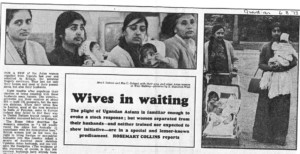
The prospects are bleak for EU citizens if they are required to face the sort of controls faced by the rest of the world’s migrants to Britain. In just the six years that Theresa May was home secretary (May 2010 – July 2016), the ability of non-EU nationals to enter or settle in the UK was consistently undermined in a variety of ways, including ever tougher criteria for entry: language tests, minimum income requirements to name a few. Fees for application were repeatedly hiked. In April 2010, the fee to apply to stay in the UK as a family member was raised to £420 per person. By the time Theresa May handed over the reins to Amber Rudd, the fee was £811, rising again a year later to £993. In April 2017, the visa fee for a dependent parent or grandparent rose to over £3,000, Similar increases have been applied across other categories including for workers. And to make it even more restrictive, a new fee was introduced in April 2017 for employers, who now have to pay £1,000 per year for each non-EU worker they recruit (unless the post is exempt). UK Government plc has been open for profit on the back of migrants for a good while now.
Added to this was the introduction in April 2015 of a health surcharge of £200 per year for ‘temporary residents’ (£150 for students), for which the justification, in the words of the Minister for Immigration and Security, James Brokenshire MP, was that it would:
play a vital role in ensuring Britain’s most cherished public service is provided on a basis that is fair to all who use it. For generations, the British public have paid their taxes to help make the NHS what it is today – the surcharge will mean temporary migrants will also pay their way.
Never mind that many ‘temporary migrants’ also pay taxes and therefore already contribute financially to the NHS – and that many of them fill vital roles in the NHS, without which it would not function.
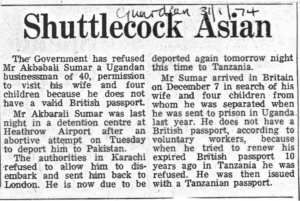
But freedom of movement rights for EU nationals were also being undermined. Homeless EU citizens have for some years been picked up, detained and deported, even if they were working or had only recently lost their job. Worse, recent regulations allow border officials to deny entry to those removed in this way, on the grounds that they have ‘abused’ free movement rights. This is probably illegal, but by the time a legal action against the UK is launched for breach of EU free movement law, the UK will have left the EU and will no longer be subject to its law.
These measures demonstrate the ruthlessness with which successive governments have used immigration control for economic (and sometimes political) ends. In this connection, it is worth remembering the longer post-war history of immigration controls in the UK as they have been applied in the past to European citizens and to former British subjects. The decisions that will be made over the next two years will not come out of a vacuum but are part of a tradition of controlling immigration for the benefit of the UK economy, using first European displaced citizens, then colonial and Commonwealth citizens and then European Economic Community (EEC), later European Union (EU) nationals.
European workers in the UK before EEC membership
In the aftermath of the second world war, the native British workforce was insufficient to meet the demands of a growing post-war economy. Concern over declining birth rates forced women, whose participation in industries during the war had been vital, to return to the home. Immigration from Ireland was encouraged but it was still not enough to meet demand. So European refugees, displaced by the war, were enabled to take up work in the UK. This was done through the European Voluntary Workers’ (EVW) scheme.
The Labour home secretary in 1946, James Chuter Ede, expressed a preference for European citizens, saying that:
he would be happier if the intake [of foreign labour] could be limited to entrants from Western countries, whose traditions and social backgrounds were more equal to our own and in whose case in would be possible to apply the sanction of deportation.[1]
The EVW scheme, which allowed entry of displaced European nationals, contained strict conditions including that workers must be single, were tied to the same job for three years and were liable to deportation for misconduct or ill-health.
To complement this, parliament passed the Polish Resettlement Act in 1947, both recognising the contribution of Polish troops in the war and also with a view to securing their labour.
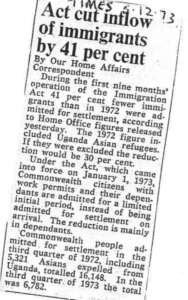
Speaking on the second reading of the bill on 12 February 1947, Osmond Peake, Conservative MP for Leeds North, highlighted the value to the country of Polish and other ‘alien’ doctors and the importance of ensuring their continued residence:
It certainly surprised me, when I read the Bill, to see that the temporary registration granted to these most useful people—when we are short of both doctors and pharmacists in this country—was to expire on 31st December this year … something will have to be done, before the end of the year, to see that we are not deprived of the services of these alien doctors, many of whom have given the most valuable service in this country.[2]
Given the dependency of today’s NHS on EU and other non-UK nationals in the workforce, the irony of the implications of Brexit will not be lost. Little, it seems, has been learnt in the last 70 years, except perhaps the ability to overlook the vital work that ‘foreigners’ have done for many years in the UK.
But this reliance upon, some would say exploitation of, European nationals still needed to be supplemented and this was done through the availability of labour from Black Commonwealth countries.
Workers from Black Commonwealth countries
There were no restrictions on the immigration to the UK of citizens of British colonies who were British subjects and subsequently became Citizens of the UK and Colonies (CUKCs) under the British Nationality Act 1948, a citizenship that they retained until either their country’s independence from the UK or the entry into force of the British Nationality Act 1981 on 1 January 1983. However, despite retaining access by virtue of nationality, immigration controls were increasingly introduced to limit the entry and residence of Black citizens into Britain.
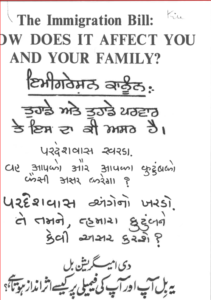
The control of Black British subjects and Commonwealth citizens’ immigration into the UK falls into three phases: before 1962, from 1962 until 1973 and from 1973 onwards – the date when the UK became a member of the European Economic Community (EEC) and labour from other European countries again became available. Britain was exchanging one source of labour for another, and a different set of rules for non-EU nationals has applied since then, adapted from time to time to the perceived needs of the UK economy.
Before 1962, restrictions on the immigration of citizens from Black Commonwealth countries were introduced through administrative measures only: UK passports were often withheld from children or elderly relatives coming to join family in the UK and from those with criminal convictions. From 1962 until 1973, vouchers were used to control entry, introduced through two Commonwealth Immigrants Acts, one in 1962, when Commonwealth immigrants’ entry was first controlled, and a second in 1968, which limited the entry of UK and Colonies citizens of South Asian origin who were being forced out of East Africa by the ‘Africanisation’ policies of Kenya and Uganda. Both Acts were passed at a time that the UK was attempting to gain entry to the EEC, with its pool of readily available labour. In parallel with further negotiations for entry, the Immigration Act 1971 was passed, introducing work permits for the first time, which would only be issued if no UK or EU national was available for the job. The 1971 Act came into force on 1 January 1973, the same day that the UK became a member of the EEC.

The 1971 Act remains the cornerstone of immigration controls in the UK today. It introduced a term called ‘patriality’, now known as the ‘right of abode’, a concept that draws upon a direct connection to the UK, for example by birth in the UK itself or by ancestry, and not by a historical connection through a colony. The Act gave only those with the right of abode the freedom to come to Britain and to live here without restriction. (Incidentally, the fee to apply for a certificate of right of abode was reduced by over 10 percent in April 2017, bucking the upward trend of fees in other categories.)
Introducing the second reading of the Immigration Bill in 1971, the Conservative home secretary, Reginald Maudling, said:
It is enormously important to reassure the immigrants already here as part of our community that they will have no loss of status under the Bill, that in this country there will be no first and second class citizens.[3]
If that statement gave any reassurance, it was taken away by the British Nationality Act 1981 which brought citizenship into line with immigration controls by splitting citizenship, for the first time, into ‘full’ British citizenship, which was built upon a connection to the UK itself, and lesser forms of citizenship, built on a connection to its colonies (present and past), which carried no right of entry to Britain. Unlike other former European colonial powers, Britain did not accord full citizenship to people in its colonies.
The ties that bind
There was one exception to the rule for colonies when it came to British citizenship: the Falkland Islands. When the UK government went to war with Argentina over the Islands in 1982, it was doing so not to defend the rights of British citizens, but British Dependent Territories Citizens, the nationality accorded to citizens of existing colonial territories under the 1981 Act. The war resulted in the passage of the British Nationality (Falkland Islands) Act in 1983 which gave Falklanders full British citizenship, and with it, unrestricted rights to enter, live and work in the UK.
Given the debate around the position of Gibraltar under Brexit, it will be interesting to see what reassurances will be given to people there compared to those afforded to EU nationals in the UK who could claim a stronger connection to the territory of the UK than people in Gibraltar. Gibraltarians who do not have a close connection to the UK itself but only to Gibraltar are not British citizens. It will not carry so much weight if the UK government goes in to bat under the slogan ‘we must defend the rights of British Dependent Territories Citizens’. Perhaps we will see a change in citizenship for Gibraltarians as the Brexit negotiations proceed.
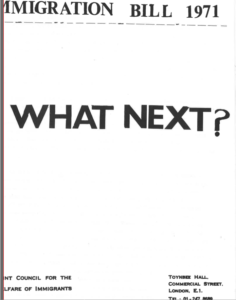
Conclusion
The slogan ‘taking back control’ was used to spearhead the Leave campaign, with immigration being the main target. The fact is that immigration into the UK has always been tightly controlled, working around the needs of the UK economy and the demands of British business. These will continue to determine the rules that should apply in the future to control the entry of those who are not British citizens. Immigration controls operate on the basis of discrimination and nationality is at its centre. We would do well to remember that, in arguing for preferential treatment for one group of nationals, we automatically fall into the trap of arguing for discrimination against others.
When attempting to inform and shape that debate, we should be arguing for rights to be attached to people and not to an organisation such as an employer or government body. In addition, that they should not be dependent upon characteristics such as nationality. And those who argue in favour of EU citizens’ rights should remember that those rights have come on the back of non-EU citizens before them and should work towards their common interests. Finally, we should never forget that people are more than workers, and that without the ability to be joined by family members, we reduce people to units of labour instead of treating them as human beings.
Related links
‘What can we expect on immigration and asylum policy post-referendum?‘

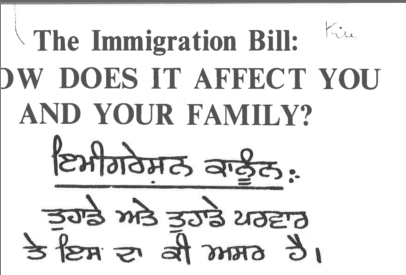
Thank you for bringing such facts to attention of even someone living since the times of many such developments/”issues” important to others not fortunate enough to have been born here, in my case noted from New Zealand and the impact on that country during my residence there in 1974/5.
My family, including my (only children) sons (aged 11 and 14 years), found ourselves dealing with “Section 48” tactics after younger son injured in attacks by another pupil (in class without adult supervision present) last November, as advised to Education Secretary for Wales as also “our” Assembly Member “seen” (in my company) last September by my son aged then ten years and trying to avoid at least potentially what (as a “nuclear” family) we feared had become “stigmatisation”, against background of at least eight serious “criminal damage with intent to endanger human life attacks” on our detached home (with fenced garden/locked gate/”security” system) and car fitted with cameras after “road rage” in Powys.
The “Equalities Officer” of Powys County Council has been approached, in part on advice of Estyn following submission of “bullying” school related concerns, after “Hate” nature of “Christmas” cards sent to our elder son at his Primary (from age 4 years in Wales) two schools by December 2010, with attacks at both and even threat (made via him) against younger brother if he had attended nearer (by at least five miles “as crow flies”) “designated” school. The reasons given, in June 2009, for such attacks were racism/anti Roman Catholic feelings/my lack of “brethren” membership, after my wife and I agreeing to Children’s Services conducting “Core Assessments” related investigations after my complaints about their tactics, by December 2007 when it had been threatened (during a GP’s visit at his request before my Complaint to GMC with “favourable” outcome “if he did it again”) in our village located home (since 2002) that children could be “taken way” just for reporting “bullying” at school/on school “mini bus” (provided by contractor of Powys County Council), but not one used by two other students living in same development of just ten homes and attending same school where they were taught down “Welsh language route” at Church in Wales (“Voluntary Control”/then “Controlled”) Primary School and my sons taught via “English medium”, but learning Welsh throughout their schools based educations, after other classes attended with my wife before Playgroup. Even, on making Complaints formally at present Primary school recently, now such correspondence is being sent to us showing name of village as “Llanarmon” (rather than “Saint Harmon” as shown on road signs) the original name seemingly dating back to sixth century following visit of French Roman Catholic Bishop to at least London after departure of Romans; I did learn Latin at school under the initial Comprehensive system, from 196o for three years under “Mason Plan”, but fail to understand why now seemingly not “allowed” use by a “school” (as for over more than seven years) of village name shown in Deeds to our property, built totally with our funds using local contractors as far as possible even after threat house would not be built unless I paid a bricklayer ten per cent above his originally quoted/agreed price that I then refused, having the surveyor find an equivalent price quoted by another such tradesman to whom I decided to pay a “bonus” of an additional ten per cent.
I do like being threatened in any way when going about normal professional transactions since being “blacklisted” personally and sustaining attack (along with my first wife in Exeter) as part of a “professional vendetta”, in mid-1980s, when I worked for the insurance broking subsidiary of Lloyds Bank (commuting to Bristol) and my wife an (ACII) employee of Royal Insurance in Exeter where the police sergeant identified the “vendetta”, immediately declared to my employer (until December 1991) but strangely such refused my correctly accepted promotion/transfer to Guildford branch for, additionally, improved safety of my wife. Sometimes “business” interests do seemingly “over-rule” fair play/human rights even for long term/born in England residents.
Vikash Tandon
24 June at 04:37 ·
The June 23rd 2016 referendum in Britain irrespective of the name calling and ‘politicking’ socially ‘engineered’ by instrumental reason (ratios and % tages); reflects an epitome of the English national-regional divide and narrow sociology-cultural-psychic horizons. The prevalence of neo-positivist philosophical orientation within the ‘powers that be’ in mainstream media, championed by political pundits and the political divide between the dominant political parties has it’s opposite face in the disenchantment of the ‘traditional working-class’ constituencies towards the changing cultural and social landscapes in areas that have been experiencing decades of ‘DE-industrialization’ commenced by the ideology of monetarism personified by the Thatcher/Reagan counter-revolutions; after the exhaustion of Keynesian state interventions during the 1970s. Blairism was/is a continuation of monetarist and empiricist legacies left over since the ‘milk snatching’ decades under ‘Thatcherism”. At a psychological and social cum cultural level communities that have been left by the wayside; particularly ‘the working-classes’ in the northern parts of England have been caught up in disenchantment with the ‘European Union’ project reflected in the psychology of fear of the ‘migration’ of East European citizens in traditionally ‘working-class’ areas. Indeed, this fear of the other is paradoxically shared by the second generation of Indian migrants from South Asia and East Africa during the 1970s. Metaphorically speaking, whilst enjoying infinite bottles of cheap imported lagers from continental Europe and the aromatic ‘chicken tikka masala’ the English ‘brexiters’ are caught up with an ‘ideality’ and reality of ‘multicultural identities and/or non-identities’.
The English identity bequeathed and nourished by the colonial and post-colonial exuberance is perpetually caught in a state of the archetypal bull-dog fight with the European Union in the name of national sovereignty. In other words the dance of non-identical identities with identical non-identities is being played in the housing estates and communities, in areas devastated by the processes of DE-industrialisation. Meanwhile thirsty politicians seek solace in an imagined oasis created by globalized finance-capital as reflected in the predominance of the service sector; personified by the financiers, bankers, property developers, insurers, and advertisers among many others in the City of London. Here the name of the game has always been to make a fast buck on the back of the toiling masses of post neo-colonial countries based in Africa and South Asian continents.
IN SUM: IRRESPECTIVE OF THE OUTCOME OF THE REFERENDUM, ENGLAND WILL WAKE UP AS A DIVIDED ‘NATION’ ON THE 24TH OF JUNE, 2016: IT SEEMS THAT THE ENGLISH BREXITERS MIGHT HAVE HAD THEIR ‘DREAMS’ COME TRUE !!! THE CRITICAL QUESTION THAT WILL REMAIN UNANSWERED IS: WHAT ARE THE CONTOURS OF AN ‘ENGLISH IDENTITY’ IN A POST-BREXIT ‘LITTLE ENGLAND’ EXHUMED BY MEMORIES OF THE DAYS WHEN THE ‘SUN NEVER SET ON BRITISH-EMPIRE’ OF BYGONE YEARS??? 4.30 AM BBC HAS JUST ANNOUNCED THAT ENGLAND HAS VOTED OUT OF EUROPEAN UNION
THIS WAS PENNED ON THE MORROW OF THE REFERENDUM VOTE. IN LIGHT OF THE INCISIVE ANALYSIS PRESENTED ABOVE BY 1RR AND THE REALITY OF THE MAINSTREAM MEDIA LED VILIFICATION OF JEREMY CORBYN’S CONSISTENT AND PRINCIPLED DEFENSE OF THE RIGHTS OF ‘IMMIGRANTS’, ‘MIGRANTS’ AND REFUGEES (POST THE ILLEGAL WAR IN IRAQ SOCIALLY ENGINEERED BY TONY BLAIR AND NEW LABOR); VOICES LIKE THE IRR AND OTHER SISTER ORGANIZATIONS NEED TO TAKE THE MESSAGE OF AN ANTI-COLONIAL – ANTI EMPIRE 2.0 – ANTI ENGLISH SOCIAL IMPERIALIST CHAUVINISM TO THE STREETS AND HOMES OF ‘LITTLE ENGLAND’. ABOVE ALL THE DEFENSE OF THE RIGHTS OF MUSLIM COMMUNITIES TO EXPRESS THEIR DEMOCRATIC OPPOSITION TO HOMOPHOBIA AND ISLAMOPHOBIA NEEDS TO PLACED AS THE HIGHEST PRIORITY IN PUBLIC SPACES AND POLITICAL DISCOURSE.